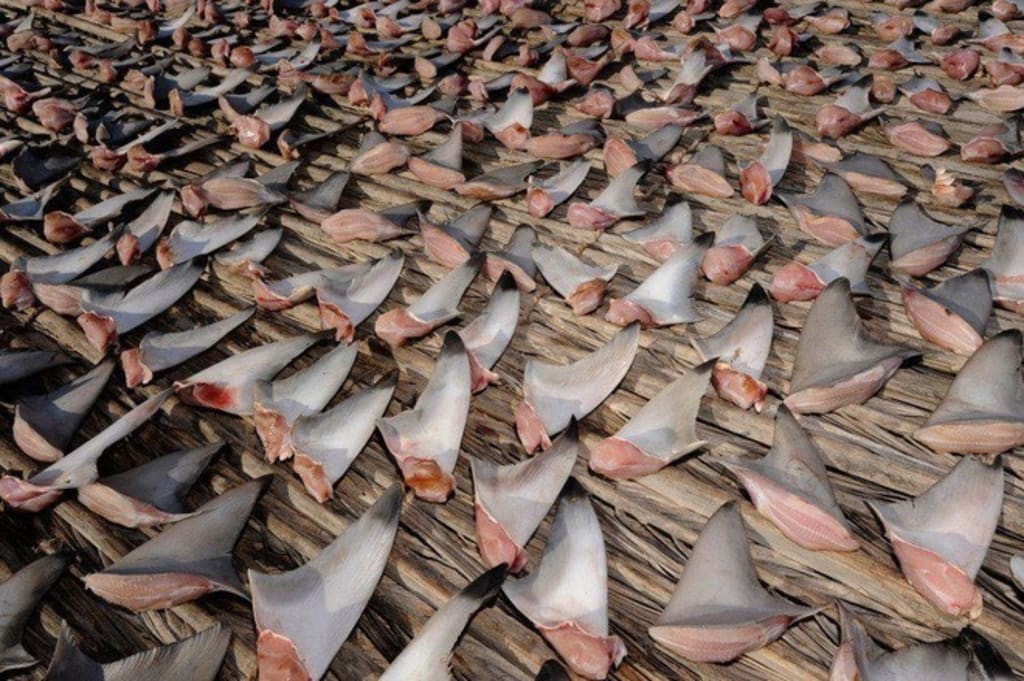Just for Fins
Sharks killed 2 people last year. Humans killed approximately 100 million sharks last year. Facts over fear, who is really the predator here?

Sharks have gained a rather bad reputation over the years, perhaps it’s because of the way they are portrayed in movies like Jaws or maybe because their multiple rows of teeth may not make them look like the cuddliest of creatures. In as early as the year 1758, they were labelled as “man-eaters” and since then have been deceived by the media as malicious predators when in reality, they are a very curious and intelligent species that aren’t worth all the worry you have before you dip your toes into the ocean. Demonizing sharks with human motives is what is driving them closer to extinction. The attacks they’ve made on humans is nothing compared to the damage we have caused to their population. We are a far greater threat to them.
Thanks to the idea that sharks are ruthless murder machines that could eat man, sport-fishing became popular and killing sharks was suddenly the new trend. Sharks were not thought of as the ideal source of food so there was hardly any funding in it for the fishermen, instead, they were thought of as pests because they would feed off of their bait and catches, for this reason along with their "man-killing" reputation, fishermen never any remorse for harming them.
Shark finning is a very gruesome act, it is the process in which the fishermen cut off only the fins of the shark and throw the remainder of the living carcass back into the water where the shark suffers a slow death by sinking to the bottom of the ocean, bleeding out, suffocating or being eaten by other fish. The remainder of the shark is considered a low-grade product so keeping the highest valued part of the shark and disposing of the rest leaves the fishermen with way more room on the ship to store more product of higher value before they return to the land to sell their catches both legally and illegally around the globe due to different laws. Some fishermen will go to the extent of taking the oil from the shark’s liver, removing teeth and jaws to sell to tourists or businesses in highly populated tourism areas. I'm sure you've seen shark tooth necklaces in the gift shops while you were on vacation before!

The demand for the popular banquet dish, first-served to Chinese emperors, “Shark Fin Soup”, heightened in China and other Asian countries. It became a symbol of status and was known for its “cure-all” health benefits which included increasing sexual potency, improving appetite, boosting vital energy, fighting cancer and is said to be beneficial for the health of your blood, kidneys, lungs, bones, and other major organs, although not proven by any evidence. This made shark fins a huge target to fishermen because it increased their monetary value. Dried shark fins are supposedly one of the most expensive seafood products by weight, sold for an estimated $1000 per kilogram in some markets and $100 a bowl in certain restaurants! It has unfortunately become a multi-billion dollar industry.

Shark finning is a great representation of profligate waste. Shark fin soup supposedly has all of these amazing health benefits yet the shark fin itself is made mostly of cartilage; the same gristle in cows and humans! Cartilage doesn’t hold any nutritional value which means most of the health benefits are coming from the broth and added herbs! Shark fins can also be dangerous to eat for pregnant or breastfeeding women and children due to the mercury toxin in the shark meat that could cause permanent nerve and brain damage. This is not an attack on the cuisine of any culture, instead, this is an attack on our unsustainable fishing trade industry. The problem is found in the production, distribution and consumption of the Shark Fin Trade. The demand is exceeding the supply. Sharks are very slow-growing fish, they take longer to mature and only produce few young every so often compared to how other varieties of fish multiply, making them extremely vulnerable to human exploitation. A study done in 2004 suggested then that 90% of the large marine species have been overfished, now they predict that in some areas up to 99% of the population has been drastically affected. Over 1/3 of all sharks are being threatened with extinction. Any shark to the finning industry is fair game, but there are certain fins they value more than others, especially the whale shark which is now classified as endangered. It is disheartening to know that species’ that have been around for over 400 million years, that have survived 5 global mass extinctions, are now starting to diminish due to the cruelty and lack of responsibility from humans. Sharks attack less than 100 people and kill a lot less than 10 people every year globally whereas humans brutally murder 100 million sharks every year, yet we dare to call them the monsters?

Whether you like them or not, the ocean needs sharks and we need the ocean. As the ocean’s most dominant predators, they control the majority of marine biodiversity; they keep the population of their prey healthier by controlling the outbreak of diseases from unhealthy contributors, keep the food chain balanced by preventing certain species’ from over-populating, and they keep habitats like coral reefs healthy. When sharks scavenge dead bodies, they release a carbon compound which is vital to the cycle of life both on land and in the ocean. We depend on sharks to keep that cycle going. They are like the white blood cells of the sea! We need to stop the shark fin trade before their horrendous slaughter drives all species of sharks affected into extinction. Only a full trade ban will stop the global trade of fins, it wouldn’t matter where the fins came from, why they were taken or which species they came from- it would stop all fisheries in the industry from passing through all the major loopholes that the under-funded and under-staffed enforcement agencies are having a hard time monitoring and policing in each state or country. Having clear rules would leave a positive exponential impact on the shark population.
If you want to help, say NO to shark fin soup! Say NO to shark jewellery, shark leather or any other shark products! Get involved by doing your research, sign petitions, participate in protests, support shark research and conservation organizations but most importantly, spread awareness! Educate your friends and family.
"If one voice can change a room then it can change a city, if it can change a city then it can change a state, if it can change a state then it can change a nation and if it can change a nation then it can change the world. Your voice can change the world."
We need to save these creatures in need. The extinction of sharks will start a domino effect on all other ocean life, losing them could cause the structure of the whole food chain to collapse. After all, the power of evolution, consistent research and historical creature connections tell us that we have more in common with sharks than you would imagine! Is greed worth the harm, just for fins? Why are "luxury" foods more important than keeping our planet's most vital ecosystems alive and healthy? The air we breathe, the food we eat, the weather, the climate patterns, the medicine we take to feel better, the economy, our very survival depends on our ocean so we better start taking care of it!
Sharks belong in the sea, not in your soup!
If there are no fins in our ocean, there is no future for us!
About the Creator
Sam Villemaire
Sam is a student from Canada who is fond of literature and writing, but also concerned deeply about the ecological issues that plague our planet. She hopes to cause awareness through empathy and spread the word of love for our home, Earth.






Comments
There are no comments for this story
Be the first to respond and start the conversation.